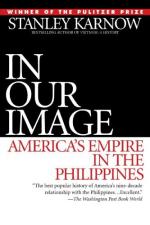
|
| Name: _________________________ | Period: ___________________ |
This test consists of 15 multiple choice questions and 5 short answer questions.
Multiple Choice Questions
1. What does McKinley's policy set up?
(a) The disastrous turn of events with the friendly native population that is to come.
(b) The successful turn of events with the friendly native population that is to come.
(c) The useless turn of events with the friendly native population that is to come.
(d) The somewhat successful turn of events with the friendly native population that is to come.
2. In the spirit of "benevolent assimilation," General Otis focuses army resources towards what?
(a) Public education and rebuilding the legal system.
(b) Converting the locals to Christianity.
(c) Teaching English to the locals.
(d) Suppressing the locals.
3. Why does this person agree to depart for Manila to take the position of governor?
(a) He would like to learn more about the Philippine culture.
(b) He has aspirations of becoming a Supreme Court judge.
(c) He has family that lives in Manila.
(d) He enjoys traveling around the world.
4. What are many powerful individuals now considering?
(a) The excitement of a U.S. colony in the Far East.
(b) The possible harm a U.S. colony would cause a group of people in the Far East.
(c) The possible benefits of a U.S. colony in the Far East.
(d) The uselessness of a U.S. colony in the Far East.
5. The country is ruled indirectly from what for three hundred years?
(a) Japan.
(b) The Spanish.
(c) The Vatican and Rome.
(d) The United States.
6. How does the insurgent force's policy gradually switch?
(a) From a policy of guerrilla tactics to traditional tactics.
(b) From a policy of guerrilla tactics to direct confrontation.
(c) From a policy of direct confrontation to guerrilla tactics.
(d) From a policy of direct confrontation to no confrontation.
7. What do the Americans do to the village of Caloocan?
(a) They convert it to Christianity.
(b) They overwhelm it and burn it to the ground.
(c) They protect it.
(d) They save it.
8. What happens to the Philippines under Spanish rule?
(a) They prosper.
(b) They stagnate.
(c) They become attached to the Spanish.
(d) They die.
9. Where do the Spaniards set up a trading post?
(a) In Bataan.
(b) In Tokyo.
(c) In Fiji.
(d) In Manila.
10. From where does the Spaniards' main threat come?
(a) English, Portuguese, Chinese, and Dutch nations.
(b) Iranian, Pakistani, Mongolian, and Puerto Rican nations.
(c) Argentinian, Chilean, Brazilian, and Venezuelan nations.
(d) Japanese, Swedish, Indian, and Italian nations.
11. How many troops does Filipino General Luna quickly get to surround the city of Manila?
(a) 300.
(b) 300,000.
(c) 3,000.
(d) 30,000.
12. European countries move out by sea and land to explore the unknown reaches of the world in what is known as what?
(a) The "Age of Discovery."
(b) The "Age of the Dinosaurs."
(c) The "Age of Enlightenment."
(d) The "Age of Man."
13. How do American commanders and troops retaliate?
(a) With an increase in forced labor camps.
(b) With a "no prisoners" policy.
(c) With a "torture the prisoners" policy.
(d) By pulling out of Manila.
14. How do priests adapt to life in the Philippines?
(a) They learn the language.
(b) They learn the language and culture, often abandoning their vows and marrying.
(c) They abandon all aspects of their previous culture.
(d) They force the natives to comply to their way of life.
15. What do some men do to avoid mandatory "service"?
(a) They fight the Spanish.
(b) They flee the country.
(c) They flee into the jungle.
(d) They commit suicide.
Short Answer Questions
1. How many weeks does it take to reach the Pacific Ocean?
2. What is the result of Dewey's cutting the telegraph cable out of Manila?
3. Since McKinley does not want war, what does he do?
4. Under pressure, McKinley appoints Roosevelt as the assistant secretary to whom, who is the secretary of the navy?
5. What creates a harsh feudal system when it comes to land ownership and taxation?
|
This section contains 641 words (approx. 3 pages at 300 words per page) |

|




